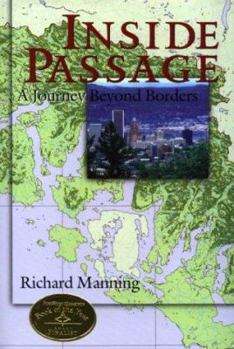Inside Passage: A Journey Beyond Borders
Select Format
Select Condition 
Book Overview
"This book is about an idea that rests at the junction of what we call wilderness and civilization. Simply, it is a call for rethinking, and more importantly, reconstructing, our relationship with... This description may be from another edition of this product.
Format:Hardcover
Language:English
ISBN:1559636556
ISBN13:9781559636551
Release Date:November 2000
Publisher:Island Press
Length:250 Pages
Weight:1.15 lbs.
Dimensions:0.7" x 6.0" x 9.0"
Customer Reviews
3 ratings
We want it all
Published by Thriftbooks.com User , 17 years ago
Richard Manning's book is frankly amazing. How he can maintain a coherent, collected mental state to write while 'connecting the dots' to such major ecological disasters is totally beyond my ken. Read the book. Follow Manning as he connects dots around the world, from Scotland to the Sacramento River in CA to Washington State and into Alaska. He has the data and the links. The last chapter summarizes the position that we all must take: "We want it all." Meaning that we can no longer argue over the boundary of a protected area. Those who would use the land, or take the fish, in any way, must get our collective permission. They must do so with the greatest recognition possible of the effects - consequences - of their actions. And those consequences must be minimized before we permit them to use _our_ Earth. There will be less business activity, true. There will be a more livable Earth, also. As we learn how to accommodate our ecosystems, we will also learn how to sustain our wonderful lives (i. e., restore that business activity). And we do want to continue living on this planet, don't we? Especially for our grandchildren. Your next step: read the book. This may be a 'far out' position to take, but I agree with Manning. What's the alternative? Whoops! Too late!
How to save the northwest
Published by Thriftbooks.com User , 23 years ago
Manning does for the Northwest what he did for the Prairie in his other great book, Grassland. Both are great reads.
The Art of Zen Ecological Repair
Published by Thriftbooks.com User , 23 years ago
Richard Manning takes his readers on a very interesting journey into a new terrain of environmentalism hinted at by his subtitle, "A Journey Beyond Borders". Traveling by sea kayak and light plane, as well as by land, he paints a grim picture of environmental degradation along the "inside passage" between Astoria Washington and Juneau Alaska. At the same time he is pricking some of the hallowed sacred cows of the conservation establishment. The primary focus of this book is on the decline of the salmon along the Pacific slope of North America. In the process he explains its relationship to lumbering and dams. He also takes a fast tour of the ecological ruin caused by the exponential growth of aquaculture around the Pacific Rim. Manning describes himself as a science writer, but he excels at turning a mixture of personal observation, interviews, and historical data into a vivid picture of decline -- not only of the salmon and the forest -- but of the people who depended on them for a livelihood.One of Manning's interesting conclusions is that, as the size and technological complexity of our food-producing and timber-harvesting efforts have increased, their efficiency has plummeted. A modern rancher in Idaho, using large quantities of subsidized water and energy, cannot begin to match the protein production of the wild salmon that once teemed the rivers of his state. His calves would have to grow into 50,000-pound cows in order to match the four-year weight gain of a wild salmon. The salmon harvested the bounty of the sea and returned it to the land without any expenditure of fossil fuel. Unfortunately, the salmon run in Idaho's Snake river has declined from 2,000,000 to less than 9,000 -- despite taxpayers spending, Manning says, "$3 billion on a Rube Goldbergian scheme of hatcheries, fish ladders, and barges that give young salmon a ride past the dams." We have traded a very efficient form of food production for a very inefficient one.Manning adds his voice to the growing chorus that argue that salmon hatcheries are not just inefficient but counterproductive. The young hatchery salmon have a very low survival rate (100 return for each million released), but they still compete with remaining wild salmon for scarce resources in stream and ocean. The kind of conservation Manning espouses is being practiced at a former salmon hatchery in Chinook Washington. The local community took it over and has turned it into a center for long-term restoration not just of a wild salmon run, but also of the habitat in the clear-cut drainage around it.Manning and his concept of borderless environmentalism is as radical as those who claim trees cause air pollution and Caspian terns are responsible for the decline in the Columbia salmon run. He thinks that most well-intentioned protectors of "wilderness" from Theodore Roosevelt and Gifford Pinchot down to present-day conservationists have not adopted a sound strategy for presserving the environment. Hi






